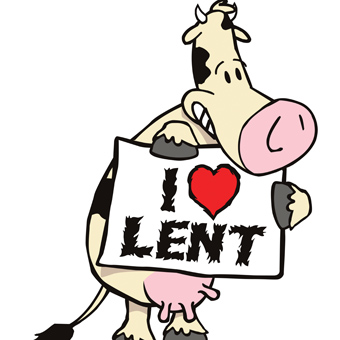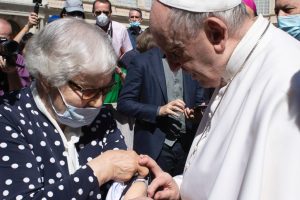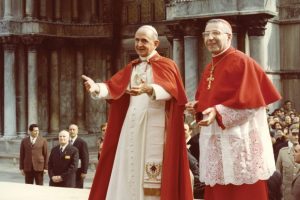Abstaining from chicken nuggets and burgers during Lent can teach us about caring for animals, our neighbors, and the Earth as much as it does about self-control.
I once thought that to be Catholic meant to eat meat. It wasn’t a holiday without Mass, Polish sausage, and turkey or ham. Even my family Christmas cookie recipe’s secret ingredient is lard. God gave us dominion of animals. Meat on our plate is God’s delicious gift to us.
It came as a surprise to my carnivorous friends, family, and to myself, therefore, when I decided to give up meat for Lent while in college. I abstained every day, not just Fridays, and fish fries were included in my fast.
Giving up meat isn’t like giving up sweets. A substantial part of my diet was missing: no more turkey sandwiches for lunch, no more spaghetti and meat sauce for dinner—both staples in Ordinary Time.
I often hear that we should do something for others rather than focus on fasting during Lent. By abstaining from meat, though, I hoped to benefit the whole world, not just myself.
My journey to a vegetarian Lent started months before in a college religion class called Buddhist Dialogue with the West. I used Catholicism to justify eating meat, so the idea that our food choices can harm our souls, bodies, and the rest of God’s creation only could reach me through Buddhism.
Buddhism’s first precept (like a commandment) is to refrain from destroying living beings. All life, from humans to plants, is interconnected. In describing the Body of Christ, Paul says, “If one member suffers, all suffer together with it” (1 Cor. 12:26). Extending Paul’s logic from the Body of Christ to all of creation made sense to me.
A reading assignment by Kate Lawrence called “Nourishing Ourselves, Nourishing Others: How Mindful Food Choices Reduce Suffering” in Mindfulness in the Marketplace (Parallax Press) taught me just how animal’s suffering was connected to my own. I was astonished to learn that when the book was published in 2002, more than 9 billion animals—30 times the U.S. human population—were killed each year in the United States alone. These animals are branded, maimed, and confined to small, crowded spaces. Factory farms pollute the air and water, and rainforests are razed to grow grain to feed cattle. That grain could fill the bellies of starving children.
Still, it’s easy to forget that a hamburger was once an animal and that its journey to my plate hurt more than just one cow. The impact of my diet finally became more tangible when I worked as an intern at a meat industry trade publication. There, I covered a story about an undercover video of animal cruelty in a poultry plant.
The video captured workers throwing and stomping on live chickens allegedly out of frustration when a shipment came in late in their shift and they couldn’t kill the birds fast enough. I imagined how taxing the job, with its long hours and low pay, must be: Bird after dirty bird passes by, struggling to scratch or peck themselves free as you hang them upside down by their feet on their way to death. No wonder workers cease to see them as God’s creation.
The next time I tried to dive into Buffalo wings, I lost my appetite. My food wasn’t just food anymore. I felt complicit in the social justice issue of poultry workers’ rights. I did not want my diet to cause undue suffering to animals or humans, but what could I do to act on these new convictions?
Buddhism made me consider my diet, but Catholicism, through Lenten fasting, gave me the means to change it. During Lent I gave up meat and prayed for the poultry workers and those who go without meat by no choice of their own.
Lent had never been more powerful—or difficult for that matter—than it was that year. Over those 40 days my compassion grew as I meditated on how my actions affect the rest of the world. I could no longer justify my selfish desires with supposedly “Catholic” ideas. God did give us dominion over creation, but that means we have the responsibility to care for it, not the freedom to destroy it.
So what did I do when my family ate ham on Easter? I ate it.
A Lenten practice ideally affects one’s entire life, not just 40 days. I still think meat is God’s delicious and healthy gift to us, but giving up meat for 40 days has made me more mindful of where my food comes from. I still can’t eat chicken, and rather than refraining from meat for one day a week, I tend to eat meat just once a week. Easter ham is from a small butcher, our Christmas turkey is free-range, and the eggs in the cookies are cage-free. Nothing goes to waste in my kitchen (even lard).
While some Christian vegetarians may see my continued desire for an occasional piece of meat as a weakness, I see it as a compromise—the Middle Way, as Buddhists say—and a sustainable and just diet that can convert even the most faithful meat-eaters like me. No meat during Lent also has become an annual spiritual practice for me now.
Vegetarians often argue about what Jesus would eat. I can’t say that he objected to eating meat, but having fasted for 40 days, Jesus likely appreciated whatever was served at the Last Supper. Having abstained from meat for 40 days, I have learned to be mindful and thankful as well.
This article appeared on the March 2008 issue of U.S. Catholic (Vol. 73, No. 3, pages 37-38).














Add comment